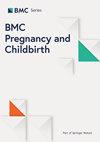COVID testing hesitancy among pregnant patients: lessons learned from the COVID-19 pandemic about the unique needs and challenges of medically complex populations
IF 2.8
2区 医学
Q1 OBSTETRICS & GYNECOLOGY
引用次数: 0
Abstract
Pregnant patients were a significant population to consider during the pandemic, given the impact of SARS-CoV-2 infection on obstetric outcomes. While COVID testing was a central pillar of infection control, it became apparent that a subset of the population declined to test. At the same time, data emerged about pregnant persons also declining testing. Yet, it was unknown why pregnant patients declined tests and if those reasons were similar or different from those of the general population. We conducted this study to explore pregnant patients’ attitudes, access, and utilization of COVID-19 testing to support healthcare for infection prevention management for this unique and medically complex population. We conducted a qualitative study of patients who were currently or recently pregnant during the early stages of the pandemic and received outpatient prenatal care at one of the participating study sites. An interview guide was used to conduct in-depth telephone interviews. Coding was performed using NVivo, and analysis was conducted using Grounded Theory. The average age of the participants (N = 37) was 32 (SD 4.21) years. Most were < 35 years of age (57%) and self-described as White (68%). Qualitative analysis identified themes related to barriers to COVID-19 testing access and use during pregnancy, including concerns about test accuracy, exposure to COVID-19 in testing facilities, isolation and separation during labor and delivery, and diminished healthcare quality and patient experience. The implementation of widespread and universal COVID testing policies did not address the unique needs and challenges of pregnant patients as a medically complex population. It is important to understand the reasons and implications for pregnant patients who declined COVID testing during the current pandemic to inform strategies to prevent infection spread in future public health emergencies.孕妇患者对 COVID 检测的犹豫不决:从 COVID-19 大流行中吸取的关于复杂医疗人群的独特需求和挑战的经验教训
鉴于 SARS-CoV-2 感染对产科结果的影响,孕妇是大流行期间需要考虑的重要人群。尽管 COVID 检测是感染控制的核心支柱,但显然有一部分人群拒绝接受检测。与此同时,还出现了孕妇也拒绝接受检测的数据。然而,怀孕患者拒绝检测的原因是什么,以及这些原因与普通人群的原因是相似还是不同,这些都是未知数。我们开展了这项研究,以探讨孕妇患者对 COVID-19 检测的态度、获取途径和使用情况,从而为这一特殊且病情复杂的人群的感染预防管理提供医疗支持。我们对大流行初期正在怀孕或刚刚怀孕的患者进行了定性研究,这些患者在参与研究的一个地点接受了门诊产前护理。我们使用访谈指南进行了深入的电话访谈。使用 NVivo 进行编码,并使用基础理论进行分析。参与者(N = 37)的平均年龄为 32 岁(标准差为 4.21)。大多数参与者的年龄小于 35 岁(57%),自称为白人(68%)。定性分析确定了与孕期接受和使用 COVID-19 检测的障碍有关的主题,包括对检测准确性的担忧、在检测设施中接触 COVID-19、分娩过程中的隔离和分离以及医疗质量和患者体验的降低。广泛而普遍的 COVID 检测政策的实施并没有解决妊娠期患者作为医疗复杂人群的独特需求和挑战。了解在当前大流行期间拒绝 COVID 检测的孕妇患者的原因和影响非常重要,这将为在未来公共卫生突发事件中预防感染传播的策略提供参考。
本文章由计算机程序翻译,如有差异,请以英文原文为准。
求助全文
约1分钟内获得全文
求助全文
来源期刊

BMC Pregnancy and Childbirth
OBSTETRICS & GYNECOLOGY-
CiteScore
4.90
自引率
6.50%
发文量
845
审稿时长
3-8 weeks
期刊介绍:
BMC Pregnancy & Childbirth is an open access, peer-reviewed journal that considers articles on all aspects of pregnancy and childbirth. The journal welcomes submissions on the biomedical aspects of pregnancy, breastfeeding, labor, maternal health, maternity care, trends and sociological aspects of pregnancy and childbirth.
 求助内容:
求助内容: 应助结果提醒方式:
应助结果提醒方式:


